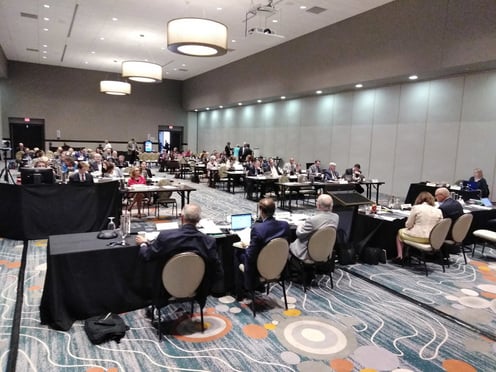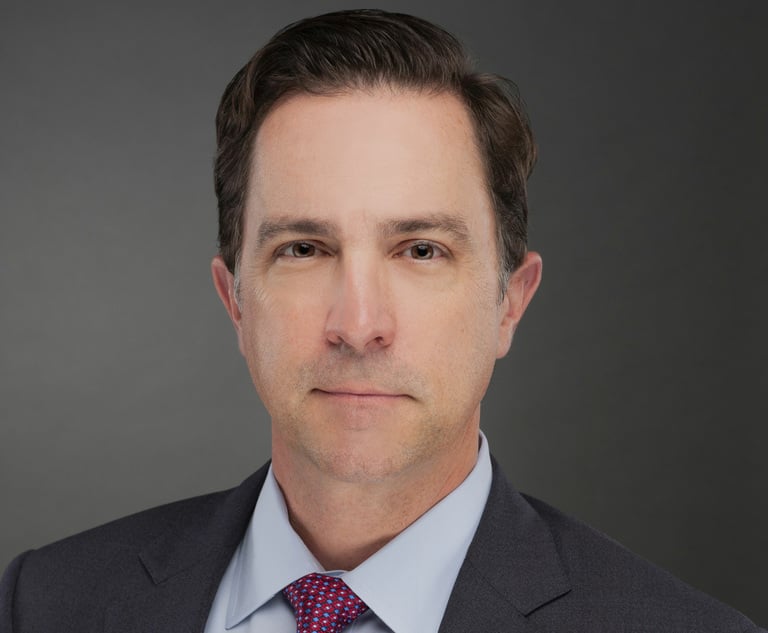Texas Bar Strikes Back Against Challenge to Mandatory Dues
“Plaintiffs' scattershot, undeveloped challenges to particular bar programs are meritless," State Bar of Texas defendants claimed.
May 14, 2019 at 11:50 AM
4 minute read
 The State Bar of Texas Board of Directors meets in Georgetown on April 26. All board members are defendants in McDonald v. Longley. Photo: Angela Morris/ALM
The State Bar of Texas Board of Directors meets in Georgetown on April 26. All board members are defendants in McDonald v. Longley. Photo: Angela Morris/ALM
State Bar of Texas defendants who are fighting a lawsuit that challenges mandatory bar dues being spent for alleged political and ideological purposes are arguing that the plaintiffs are using erroneous legal arguments and have sued the wrong people.
The defendants made a bevy of filings in the case, McDonald v. Longley, in which three attorneys have claimed that the bar is violating their First Amendment rights. They claim the bar forces them to join and pay mandatory dues, which it then spends on activities the plaintiffs disagree with, such as LGBT continuing legal education, legal aid for undocumented immigrants, diversity efforts, legal aid programs and legislative affairs efforts.
“We believe the State Bar is fulfilling all of its statutory and constitutional obligations. The plaintiffs' efforts to change decades of law is without merit,” bar executive director Trey Apffel said in a statement.
Consovoy McCarthy Park partner Jeff Harris of Arlington, Virginia, who represents the plaintiffs, declined to comment.
The McDonald case is similar to legal challenges that lawyers have filed against mandatory bar associations in Oklahoma, Oregon and North Dakota. In all the cases, the plaintiffs rely on a 2018 U.S. Supreme Court ruling in Janus v. AFSCME, which ruled that public sector nonunion workers cannot be required to pay union dues as a condition of employment.
The defendants filed a motion to dismiss the lawsuit, arguing the court doesn't have jurisdiction over the dispute because of sovereign immunity. They argued they have no power to address the alleged injury of the plaintiffs.
“Defendants neither imposed nor enforce the requirements that plaintiffs enroll and maintain membership in the state bar and pay the legal services fee,” the motion said.
Instead, the Texas Legislature passed the State Bar Act, which governs the bar's operations, and also imposes the requirement for lawyers to join the bar and pay dues. Similarly, the defendants can't control a $65 legal services fee that the plaintiffs complained about because the legislature set that fee and lawyers pay it to the Texas Supreme Court.
In a response to the plaintiffs' motion for summary judgment, the Texas bar is arguing that Janus should not apply to mandatory bar associations.
According to the response, Lathrop v. Donohue in 1961 said the mandatory bar doesn't violate lawyers' right to freedom of association. Then Keller v. State Bar of California in 1990 held that mandatory dues don't violate free speech rights if fees pay for regulating the profession or improving the quality of legal services.
The plaintiffs argue that Janus overruled Keller and Lathrop, said the response. However, a judge in Oregon rejected that argument in Gruber v. Oregon State Bar, a case that's challenging the mandatory bar in Oregon. In fact, a justice dissented from the Janus ruling and emphasized that the majority wasn't questioning the Keller ruling, said the response.
“Janus's reassessment of whether the state's interests in maintaining labor peace and avoiding nonmember free riding on unions' collective-bargaining efforts justify compelled payments from nonmembers does not undermine the Supreme Court's endorsement of the very different state interests in professional regulation and legal-service quality served by integrated bars,” the response said. “Plaintiffs' scattershot, undeveloped challenges to particular bar programs are meritless.”
The response also said the bar has safeguards within its policy manual that ensure all its activities meet its core functions, including the specific programs the plaintiffs have challenged. The defendants are asking the court to deny the plaintiffs' summary judgment motion.
They raised many of the same legal arguments in a cross-motion for summary judgment.
“Plaintiffs' claims fail as a matter of law, such that there is no need for the court to resolve any material factual disputes,” the cross-motion said.
The defendants filed opposition to the plaintiffs' motion for a preliminary injunction, arguing the plaintiffs don't meet requirements to receive the extraordinary remedy of a preliminary injunction. They argue plaintiffs can't show they're likely to succeed on the merits of their claims. Their motion in opposition argues that if the court did issue a preliminary injunction, it would interfere with the bar's collection of dues and jeopardize the bar's operations to regulate the profession and improve legal services.
Read the defendants' cross-motion for summary judgment:
This content has been archived. It is available through our partners, LexisNexis® and Bloomberg Law.
To view this content, please continue to their sites.
Not a Lexis Subscriber?
Subscribe Now
Not a Bloomberg Law Subscriber?
Subscribe Now
NOT FOR REPRINT
© 2025 ALM Global, LLC, All Rights Reserved. Request academic re-use from www.copyright.com. All other uses, submit a request to [email protected]. For more information visit Asset & Logo Licensing.
You Might Like
View All
O'Melveny, White & Case, Skadden Beef Up in Texas With Energy, Real Estate Lateral Partner Hires
5 minute read
Chamberlain Hrdlicka Taps a New Leader as Firm Follows Succession Planning Path
3 minute read
Law Firms Are 'Struggling' With Partner Pay Segmentation, as Top Rainmakers Bring In More Revenue
5 minute read
Trending Stories
- 1Robinson & Cole Adds to Immigration Team in Philly
- 2DC Circuit Revives Firefighters' Religious Freedom Litigation in Facial Hair Policy Row
- 3‘High Demand’: Former Trump Admin Lawyers Leverage Connections for Big Law Work, Jobs
- 4Considerations for Establishing or Denying a Texas Partnership to Invest in Real Estate
- 5In-House AI Adoption Stalls Despite Rising Business Pressures
Who Got The Work
J. Brugh Lower of Gibbons has entered an appearance for industrial equipment supplier Devco Corporation in a pending trademark infringement lawsuit. The suit, accusing the defendant of selling knock-off Graco products, was filed Dec. 18 in New Jersey District Court by Rivkin Radler on behalf of Graco Inc. and Graco Minnesota. The case, assigned to U.S. District Judge Zahid N. Quraishi, is 3:24-cv-11294, Graco Inc. et al v. Devco Corporation.
Who Got The Work
Rebecca Maller-Stein and Kent A. Yalowitz of Arnold & Porter Kaye Scholer have entered their appearances for Hanaco Venture Capital and its executives, Lior Prosor and David Frankel, in a pending securities lawsuit. The action, filed on Dec. 24 in New York Southern District Court by Zell, Aron & Co. on behalf of Goldeneye Advisors, accuses the defendants of negligently and fraudulently managing the plaintiff's $1 million investment. The case, assigned to U.S. District Judge Vernon S. Broderick, is 1:24-cv-09918, Goldeneye Advisors, LLC v. Hanaco Venture Capital, Ltd. et al.
Who Got The Work
Attorneys from A&O Shearman has stepped in as defense counsel for Toronto-Dominion Bank and other defendants in a pending securities class action. The suit, filed Dec. 11 in New York Southern District Court by Bleichmar Fonti & Auld, accuses the defendants of concealing the bank's 'pervasive' deficiencies in regards to its compliance with the Bank Secrecy Act and the quality of its anti-money laundering controls. The case, assigned to U.S. District Judge Arun Subramanian, is 1:24-cv-09445, Gonzalez v. The Toronto-Dominion Bank et al.
Who Got The Work
Crown Castle International, a Pennsylvania company providing shared communications infrastructure, has turned to Luke D. Wolf of Gordon Rees Scully Mansukhani to fend off a pending breach-of-contract lawsuit. The court action, filed Nov. 25 in Michigan Eastern District Court by Hooper Hathaway PC on behalf of The Town Residences LLC, accuses Crown Castle of failing to transfer approximately $30,000 in utility payments from T-Mobile in breach of a roof-top lease and assignment agreement. The case, assigned to U.S. District Judge Susan K. Declercq, is 2:24-cv-13131, The Town Residences LLC v. T-Mobile US, Inc. et al.
Who Got The Work
Wilfred P. Coronato and Daniel M. Schwartz of McCarter & English have stepped in as defense counsel to Electrolux Home Products Inc. in a pending product liability lawsuit. The court action, filed Nov. 26 in New York Eastern District Court by Poulos Lopiccolo PC and Nagel Rice LLP on behalf of David Stern, alleges that the defendant's refrigerators’ drawers and shelving repeatedly break and fall apart within months after purchase. The case, assigned to U.S. District Judge Joan M. Azrack, is 2:24-cv-08204, Stern v. Electrolux Home Products, Inc.
Featured Firms
Law Offices of Gary Martin Hays & Associates, P.C.
(470) 294-1674
Law Offices of Mark E. Salomone
(857) 444-6468
Smith & Hassler
(713) 739-1250






